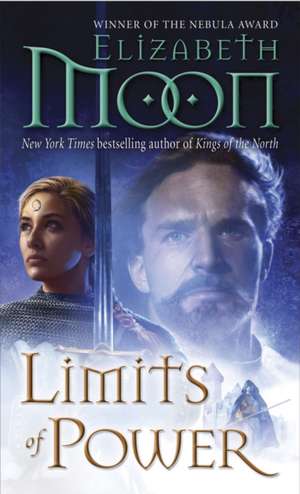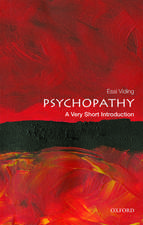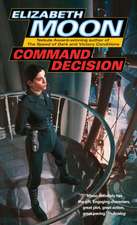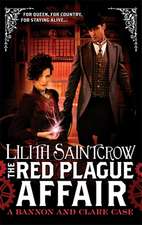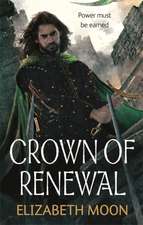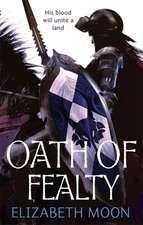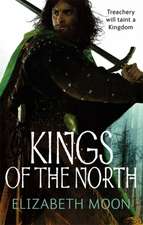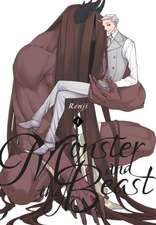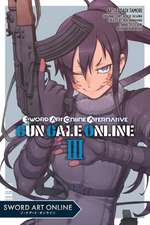Limits of Power: Legend of Paksenarrion
Autor Elizabeth Moonen Limba Engleză Paperback – 28 apr 2014
The unthinkable has occurred in the kingdom of Lyonya. The queen of the Elves—known as the Lady—is dead, murdered by former elves twisted by dark powers. Now the Lady’s half-elven grandson must heal the mistrust between elf and human before their enemies strike again. Yet as he struggles to make ready for an attack, an even greater threat looms across the Eight Kingdoms.
Throughout the north, magic is reappearing after centuries of absence, emerging without warning in family after family—rich and poor alike. In some areas, the religious strictures against magery remain in place, and fanatical followers are stamping out magery by killing whoever displays the merest sign of it—even children. And as unrest spreads, one very determined traitor works to undo any effort at peace—no matter how many lives it costs. With the future hanging in the balance, it is only the dedication of a few resolute heroes who can turn the tides . . . if they can survive.
Praise for Limits of Power
“It’s easy to become fully immersed in, and absorbed by, the narrative: [Moon’s] great strength lies in the patient accumulation of telling detail, yielding an extraordinarily rich picture of the world’s politics, philosophy, military structure, history, magic and alien cultures, where men and women stand as equals even in force of arms.”—Kirkus Reviews
“Thoughtful and deeply character driven, full of personal crises as heartbreaking and hopeful as any dramatic invasion . . . Moon deftly avoids big literary explosions, preferring instead a slow boil that builds pressure without relief. There are plots within plots, but the complex story is never confusing. Fantasy fans will be delighted by this impressive foray.”—Publishers Weekly (starred review)
Praise for Elizabeth Moon
“This is an excellent series, and Echoes of Betrayal is particularly well done. [Elizabeth Moon is a] consistently entertaining writer, and this book lives up to her standards.”—San Jose Mercury News
“Moon’s characters navigate an intricate maze of alliances and rivalries. . . . Close attention to military detail gives the action convincing intensity.”—The Star-Ledger, on Kings of the North
“A triumphant return to the fantasy world she created . . . No one writes fantasy quite like Moon.”—The Miami Herald, on Oath of Fealty
From the Hardcover edition.
Preț: 49.22 lei
Nou
Puncte Express: 74
Preț estimativ în valută:
9.42€ • 9.80$ • 7.78£
9.42€ • 9.80$ • 7.78£
Carte indisponibilă temporar
Doresc să fiu notificat când acest titlu va fi disponibil:
Se trimite...
Preluare comenzi: 021 569.72.76
Specificații
ISBN-13: 9780345533081
ISBN-10: 0345533089
Pagini: 512
Dimensiuni: 107 x 173 x 33 mm
Greutate: 0.25 kg
Editura: Del Rey Books
Seria Legend of Paksenarrion
ISBN-10: 0345533089
Pagini: 512
Dimensiuni: 107 x 173 x 33 mm
Greutate: 0.25 kg
Editura: Del Rey Books
Seria Legend of Paksenarrion
Notă biografică
Former Marine Elizabeth Moon is the author of many novels, including Echoes of Betrayal, Kings of the North, Oath of Fealty, the Deed of Paksenarrion trilogy, Victory Conditions, Command Decision, Engaging the Enemy, Marque and Reprisal, Trading in Danger, the Nebula Award winner The Speed of Dark, and Remnant Population, a Hugo Award finalist. After earning a degree in history from Rice University, Moon went on to obtain a degree in biology from the University of Texas, Austin. She lives in Florence, Texas.
Extras
Chapter One
Chaya, in Lyonya
You killed her!” That first voice, instantly joined by others, rose in a furious screech of accusation. “You killed her! You killed her!”
The angry voices penetrated Kieri’s grief and exhaustion, and he looked back over his shoulder to see at least a dozen elves, some with swords drawn, his uncle Amrothlin among them. Behind them, more Squires pushed into the room.
“I did not,” he said. “I tried—”
“She’s dead! You’re alive; you must have—!”
“I tried to save her,” Kieri said. “I could not.” He stood up then, automatically collecting his weapons as he rose.
“Let me see that!” Amrothlin strode forward, pointing at Kieri’s sword. “If it has her blood on it—”
“Of course it does,” Kieri said. “You saw: my sword lay in her blood, there on the floor.” He had knelt in her blood, he realized, and his hands were stained. No wonder Amrothlin suspected him, though the blood that spattered his clothes had come from others.
Amrothlin reached out his hand. “Let me smell it. I know her scent; I will know another’s scent, if indeed another’s blood is there. Give it to me.”
“No,” Arian said before Kieri could answer, blocking Amrothlin with her arm. “You will not disarm the king,” she said. “Not after what has happened.”
“You!” Amrothlin glared at her. “You half-bred troublemaker, child of one who should never have sired children on mortals—”
“Daughter of one who gave his life to save the Lady,” Arian said. Kieri saw the glitter of both tears and anger in her eyes. “There he lies, and you would insult him?”
“And you know you cannot hold this sword,” Kieri said, forcing a calm tone through the anger he felt. How dare Amrothlin insult Arian—and where had he been all this time? Was he the traitor? “You remember: it’s sealed to me. Smell if you wish, but do not touch it.”
Amrothlin glared at them all, then fixed his gaze on Arian. “What should I think when I find three mortals around my Lady’s body with swords drawn and her blood run out like water from a cracked jug? I see no other foe here. It is you, I say, and this—this so-called king.”
Kieri glanced past Amrothlin. The ring of elves stood tense; behind them were Squires who hesitated to push them aside, and behind those the hooded figures of two Kuakkgani. He met Amrothlin’s angry gaze once more.
“I am the king,” he said, keeping his voice as steady as he could. “I am the king, and my mother was your sister, and this Lady was my grandmother. So we are kin, whether you like it or not. If you can indeed detect identity by the smell of the blood, then you will smell another immortal’s blood on this—and on the queen’s sword and Duke Verrakai’s as well.”
“Do you dare accuse an elf?” Amrothlin asked. He still trembled like a candle flame, but his voice had calmed.
“The one who did this could appear without walking through a door. Its mien seemed elven at first and also its magery, a glamour of the same sort as the Lady was wont to cast. Yet it was like no elf I have known in its malice and determination to kill the Lady. I believe you name such iynisin; in Tsaia we called them kuaknomi.”
Amrothlin glared. “We do not speak of them.” He looked over his shoulder, then back to Kieri. “Who was here at the time?”
“Later,” Kieri said. Voices rose in the corridor: angry, frightened, demanding. Time to take command. “Uncle, this is not the time for questions. I am the king, and I am not your enemy, nor the Lady’s. People are frightened; I must speak to them.”
Before Amrothlin could answer, he raised his voice and called to those beyond the room. “The danger is over for now: I, the king, am alive, and the queen is safe here with me. Those of you in the corridor: fetch the palace physicians for the wounded. The rest disperse, but for the Queen’s Squires assigned to the queen today and one Kuakgan. Put by your swords.” The elves by the door looked at Amrothlin, who said nothing, and then at Kieri again and finally put up their swords. Two Queen’s Squires made their way into the room and edged through the elves to Arian’s side.
Dorrin had already moved to one of the wounded Squires. “This one first, sir king. Both are sore wounded, and though I tried, I cannot heal them.”
Kieri knelt beside her. When he laid his hand on the man’s shoulder, he felt nothing but a heaviness. “Nor I,” he said, standing again. “I must be more worn than I thought.”
The noise outside diminished. “I will tell the whole of it to Amrothlin,” Kieri said to the elves. “Two may remain; the rest of you go and make what preparations you need make for the Lady’s rest.” He knelt beside the other Squire yet felt no healing power in himself. Sighing, he stood again.
Amrothlin’s stony expression did not change, but he did not contradict Kieri; with a wave of his hand he sent most of the elves away. Now the carnage showed more clearly—the pools of blood, the stench of blood and death, bloody footprints on the fine carpet, what looked like scorch marks, the dead: the Lady, Dameroth, another dead elf whose name Kieri did not know, Tolmaric’s twisted and shrunken body, and the two iynisin Kieri and Arian and Dorrin had killed. Arian’s clothes were as bloodstained as his own, and Dorrin, though she had not knelt in any blood, still had splashes on her shirt and sword hand.
“More dead elves,” one of the other elves said, bending to examine them. Then he stiffened, turning back to Amrothlin. “My lord! These are not elves! They are . . . what the king said.”
Amrothlin, still looking at Kieri, said, “Is this what you fought? Did you kill it?”
“That is another it split from its body after it killed Sier Tolmaric,” Kieri said. “Look at Tolmaric, look at its body, and if you can explain how that was done, I will be glad.”
Amrothlin turned and walked over to Tolmaric’s remains. “This was human?” He sounded more worried than angry now.
“Yes. The iynisin did that with a touch of its blade to his throat. He was already bespelled by the Lady, as I said, and helpless.”
“Where were you?”
“There.” Kieri pointed. He told of questioning Sier Tolmaric, the Lady’s interruption, and then the appearance of the iynisin—he insisted on using the name, though Amrothlin flinched every time—and its taunting of the Lady and attack. “I had just taken such a blow on my shoulder as almost threw me down. It was almost invisible; I could not see to parry the blow—and then it made for poor Tolmaric and did that to him, whatever that is. Then from the iynisin came two more, and each of those split into two.”
“A formidable foe indeed,” Amrothlin said. “Few of . . . such . . . can do that, and only with fresh blood and life taken.” He moved over beside the elf looking at the other body. Kieri saw his shoulders stiffen. Amrothlin crouched beside the body and touched the blood staining its dark clothes, then sniffed at his fingers. He stood and faced Kieri again. “You brought this on us.”
“What?” That accusation made no sense to him.
“You could not survive such a one unless it willed it so. The—these beings—” Even now Amrothlin would not use the word. “You know their origin? Traitors who once were elves, in the morning of the world, and who turned against all because of those.” He pointed at the Kuakgan now standing near the door. “You called Kuakkgani here; that must be why the evil ones came. We do not speak of them. We do not acknowledge them.”
“And yet these iynisin exist,” Kieri said, once more using the elven name for them. “And they—or one—killed the Lady. Are all of them that powerful?” This, he was certain, was one of the secrets the elves had withheld from him; how could they think that not speaking of danger meant it did not exist?
“So you say, that she was killed by such.” Amrothlin made an obvious attempt to calm down, but did not answer Kieri’s question. He sniffed his fingers again. “It is more likely a lord of the Severance could kill her than a half-human like you,” he said. “These dead are certainly ephemes, split from such a one. And that—” He glanced at Tolmaric’s remains. “That is what any living thing looks like that they destroy to make ephemes.” He nodded to Kieri, now apparently calm. “I accept your story of the fight, but still—it is your fault that the Lady came here unescorted and such evil followed her. You knew what she thought of the . . . the Kuakkgani.” He nearly spat the last word, his voice full of venom again.
“What I see is that you are determined to blame the king,” Arian said. Kieri had never seen her so angry before. Flanked by her Squires, she stalked over to him. “Where were you when I was poisoned and my child never had a chance to live? The Lady did not come. None of you came. It was a Kuakgan who found the poison concealed in a block of spice: you elves did nothing. And you blame us for that?”
Amrothlin stared at her, speechless in the face of her anger.
“So now,” Kieri said, taking over once more, “let us clean up this mess and confer.” The palace physicians bustled into the room; he pointed to Binir and Curn, the two wounded Squires. Linne, another of the King’s Squires, handed him cleaning materials for his sword; he began wiping it down. Arian handed her blade to one of her Squires. “Who is now the ruler of the elvenhome?” Kieri asked Amrothlin. “Will it be you, her son, or had she named another in her stead?”
Amrothlin shook his head. “There is no elvenhome.”
“What—? Of course there is . . . must be.” At the look on Amrothlin’s face, Kieri said, “How can it be gone?”
“Do you not see?” Amrothlin gestured to his own grief-stricken face. “Do I look the same? Do you feel the influence of the elvenhome? It was hers—her creation—and it died with her. She alone sustained the Ladysforest; she had no heir. We are unhomed, Nephew. We are cast away, and nowhere in the world will we find a home now.”
“That cannot be. The taig is still here.” Kieri could feel the taig, the strength of it, even in its grief.
“The taig, yes. It is the spirit of all life. Where there is life, there is taig, greater and smaller. The taig nourishes elvenkind, and elvenkind nourishes the taig. We encouraged it, taught it, lifted it toward more awareness, according to the Lady’s design. But it is not the elvenhome.”
This was the longest explanation Kieri had ever heard about the relationship of elves and taig. “Then what is an elvenhome? Did the Lady then maintain the elvenhome with her own power? By herself?” And if so, how could such a power be stripped away?
“At first, yes,” Amrothlin said. “But after we left the great hall below, in the time of the banast taig . . .” His voice trailed away; he looked down and away. “I cannot talk of it now, Nephew, please. Her power diminished, and now she is gone; the elfane taig is gone; I must prepare to lay her body to rest.”
Kieri felt tears rising in his eyes and blinked them back. “Why didn’t you ever tell me? Why didn’t Orlith? If I had known—”
“You would have tried to interfere,” Amrothlin said, his voice harsh again. “And what could you, a mortal, do? You had no power to lend us. You could but cause the Lady more anguish, to know that you knew her shame.”
“And this is better?” Kieri asked. The familiar irritation with elven arrogance overrode even his fatigue. He waved at the room, at the bodies and the blood and the stench of death. “Her pride cost you dear, Uncle. You were so sure we could not help, you did not even seek understanding, let alone alliance—”
“How could such as you understand?” Amrothlin said. He looked more weary than angry now, his grace diminished. “What we live—what she lived—is beyond your comprehension. It is no use to explain; you do not have the mind for it.”
Kieri’s anger grew, but he knew that for a postbattle reaction as much as a fair response to Amrothlin. He glanced around the room. Everyone but the physicians working on the wounded Squires was looking at him. This was not the time to continue a quarrel with Amrothlin.
“Are any others wounded and in need of care?” No one answered. Arian’s Squire returned her blade, now cleaned, and Arian slid it into the scabbard. Kieri had almost finished with his own.
“We will need to make a bier to move her,” Amrothlin said. “And . . . and the others.”
“Is there any menace in Sier Tolmaric’s remains?” Kieri asked.
“No,” Amrothlin said. “The evil destroyed him but does not remain. Do what you will with . . . that.” He gestured toward Tolmaric’s body but averted his gaze. “But beware the iynisin ephemes. Even their blood taints anything alive or that once lived. You must burn such things in a safe place away from here.”
Chaya, in Lyonya
You killed her!” That first voice, instantly joined by others, rose in a furious screech of accusation. “You killed her! You killed her!”
The angry voices penetrated Kieri’s grief and exhaustion, and he looked back over his shoulder to see at least a dozen elves, some with swords drawn, his uncle Amrothlin among them. Behind them, more Squires pushed into the room.
“I did not,” he said. “I tried—”
“She’s dead! You’re alive; you must have—!”
“I tried to save her,” Kieri said. “I could not.” He stood up then, automatically collecting his weapons as he rose.
“Let me see that!” Amrothlin strode forward, pointing at Kieri’s sword. “If it has her blood on it—”
“Of course it does,” Kieri said. “You saw: my sword lay in her blood, there on the floor.” He had knelt in her blood, he realized, and his hands were stained. No wonder Amrothlin suspected him, though the blood that spattered his clothes had come from others.
Amrothlin reached out his hand. “Let me smell it. I know her scent; I will know another’s scent, if indeed another’s blood is there. Give it to me.”
“No,” Arian said before Kieri could answer, blocking Amrothlin with her arm. “You will not disarm the king,” she said. “Not after what has happened.”
“You!” Amrothlin glared at her. “You half-bred troublemaker, child of one who should never have sired children on mortals—”
“Daughter of one who gave his life to save the Lady,” Arian said. Kieri saw the glitter of both tears and anger in her eyes. “There he lies, and you would insult him?”
“And you know you cannot hold this sword,” Kieri said, forcing a calm tone through the anger he felt. How dare Amrothlin insult Arian—and where had he been all this time? Was he the traitor? “You remember: it’s sealed to me. Smell if you wish, but do not touch it.”
Amrothlin glared at them all, then fixed his gaze on Arian. “What should I think when I find three mortals around my Lady’s body with swords drawn and her blood run out like water from a cracked jug? I see no other foe here. It is you, I say, and this—this so-called king.”
Kieri glanced past Amrothlin. The ring of elves stood tense; behind them were Squires who hesitated to push them aside, and behind those the hooded figures of two Kuakkgani. He met Amrothlin’s angry gaze once more.
“I am the king,” he said, keeping his voice as steady as he could. “I am the king, and my mother was your sister, and this Lady was my grandmother. So we are kin, whether you like it or not. If you can indeed detect identity by the smell of the blood, then you will smell another immortal’s blood on this—and on the queen’s sword and Duke Verrakai’s as well.”
“Do you dare accuse an elf?” Amrothlin asked. He still trembled like a candle flame, but his voice had calmed.
“The one who did this could appear without walking through a door. Its mien seemed elven at first and also its magery, a glamour of the same sort as the Lady was wont to cast. Yet it was like no elf I have known in its malice and determination to kill the Lady. I believe you name such iynisin; in Tsaia we called them kuaknomi.”
Amrothlin glared. “We do not speak of them.” He looked over his shoulder, then back to Kieri. “Who was here at the time?”
“Later,” Kieri said. Voices rose in the corridor: angry, frightened, demanding. Time to take command. “Uncle, this is not the time for questions. I am the king, and I am not your enemy, nor the Lady’s. People are frightened; I must speak to them.”
Before Amrothlin could answer, he raised his voice and called to those beyond the room. “The danger is over for now: I, the king, am alive, and the queen is safe here with me. Those of you in the corridor: fetch the palace physicians for the wounded. The rest disperse, but for the Queen’s Squires assigned to the queen today and one Kuakgan. Put by your swords.” The elves by the door looked at Amrothlin, who said nothing, and then at Kieri again and finally put up their swords. Two Queen’s Squires made their way into the room and edged through the elves to Arian’s side.
Dorrin had already moved to one of the wounded Squires. “This one first, sir king. Both are sore wounded, and though I tried, I cannot heal them.”
Kieri knelt beside her. When he laid his hand on the man’s shoulder, he felt nothing but a heaviness. “Nor I,” he said, standing again. “I must be more worn than I thought.”
The noise outside diminished. “I will tell the whole of it to Amrothlin,” Kieri said to the elves. “Two may remain; the rest of you go and make what preparations you need make for the Lady’s rest.” He knelt beside the other Squire yet felt no healing power in himself. Sighing, he stood again.
Amrothlin’s stony expression did not change, but he did not contradict Kieri; with a wave of his hand he sent most of the elves away. Now the carnage showed more clearly—the pools of blood, the stench of blood and death, bloody footprints on the fine carpet, what looked like scorch marks, the dead: the Lady, Dameroth, another dead elf whose name Kieri did not know, Tolmaric’s twisted and shrunken body, and the two iynisin Kieri and Arian and Dorrin had killed. Arian’s clothes were as bloodstained as his own, and Dorrin, though she had not knelt in any blood, still had splashes on her shirt and sword hand.
“More dead elves,” one of the other elves said, bending to examine them. Then he stiffened, turning back to Amrothlin. “My lord! These are not elves! They are . . . what the king said.”
Amrothlin, still looking at Kieri, said, “Is this what you fought? Did you kill it?”
“That is another it split from its body after it killed Sier Tolmaric,” Kieri said. “Look at Tolmaric, look at its body, and if you can explain how that was done, I will be glad.”
Amrothlin turned and walked over to Tolmaric’s remains. “This was human?” He sounded more worried than angry now.
“Yes. The iynisin did that with a touch of its blade to his throat. He was already bespelled by the Lady, as I said, and helpless.”
“Where were you?”
“There.” Kieri pointed. He told of questioning Sier Tolmaric, the Lady’s interruption, and then the appearance of the iynisin—he insisted on using the name, though Amrothlin flinched every time—and its taunting of the Lady and attack. “I had just taken such a blow on my shoulder as almost threw me down. It was almost invisible; I could not see to parry the blow—and then it made for poor Tolmaric and did that to him, whatever that is. Then from the iynisin came two more, and each of those split into two.”
“A formidable foe indeed,” Amrothlin said. “Few of . . . such . . . can do that, and only with fresh blood and life taken.” He moved over beside the elf looking at the other body. Kieri saw his shoulders stiffen. Amrothlin crouched beside the body and touched the blood staining its dark clothes, then sniffed at his fingers. He stood and faced Kieri again. “You brought this on us.”
“What?” That accusation made no sense to him.
“You could not survive such a one unless it willed it so. The—these beings—” Even now Amrothlin would not use the word. “You know their origin? Traitors who once were elves, in the morning of the world, and who turned against all because of those.” He pointed at the Kuakgan now standing near the door. “You called Kuakkgani here; that must be why the evil ones came. We do not speak of them. We do not acknowledge them.”
“And yet these iynisin exist,” Kieri said, once more using the elven name for them. “And they—or one—killed the Lady. Are all of them that powerful?” This, he was certain, was one of the secrets the elves had withheld from him; how could they think that not speaking of danger meant it did not exist?
“So you say, that she was killed by such.” Amrothlin made an obvious attempt to calm down, but did not answer Kieri’s question. He sniffed his fingers again. “It is more likely a lord of the Severance could kill her than a half-human like you,” he said. “These dead are certainly ephemes, split from such a one. And that—” He glanced at Tolmaric’s remains. “That is what any living thing looks like that they destroy to make ephemes.” He nodded to Kieri, now apparently calm. “I accept your story of the fight, but still—it is your fault that the Lady came here unescorted and such evil followed her. You knew what she thought of the . . . the Kuakkgani.” He nearly spat the last word, his voice full of venom again.
“What I see is that you are determined to blame the king,” Arian said. Kieri had never seen her so angry before. Flanked by her Squires, she stalked over to him. “Where were you when I was poisoned and my child never had a chance to live? The Lady did not come. None of you came. It was a Kuakgan who found the poison concealed in a block of spice: you elves did nothing. And you blame us for that?”
Amrothlin stared at her, speechless in the face of her anger.
“So now,” Kieri said, taking over once more, “let us clean up this mess and confer.” The palace physicians bustled into the room; he pointed to Binir and Curn, the two wounded Squires. Linne, another of the King’s Squires, handed him cleaning materials for his sword; he began wiping it down. Arian handed her blade to one of her Squires. “Who is now the ruler of the elvenhome?” Kieri asked Amrothlin. “Will it be you, her son, or had she named another in her stead?”
Amrothlin shook his head. “There is no elvenhome.”
“What—? Of course there is . . . must be.” At the look on Amrothlin’s face, Kieri said, “How can it be gone?”
“Do you not see?” Amrothlin gestured to his own grief-stricken face. “Do I look the same? Do you feel the influence of the elvenhome? It was hers—her creation—and it died with her. She alone sustained the Ladysforest; she had no heir. We are unhomed, Nephew. We are cast away, and nowhere in the world will we find a home now.”
“That cannot be. The taig is still here.” Kieri could feel the taig, the strength of it, even in its grief.
“The taig, yes. It is the spirit of all life. Where there is life, there is taig, greater and smaller. The taig nourishes elvenkind, and elvenkind nourishes the taig. We encouraged it, taught it, lifted it toward more awareness, according to the Lady’s design. But it is not the elvenhome.”
This was the longest explanation Kieri had ever heard about the relationship of elves and taig. “Then what is an elvenhome? Did the Lady then maintain the elvenhome with her own power? By herself?” And if so, how could such a power be stripped away?
“At first, yes,” Amrothlin said. “But after we left the great hall below, in the time of the banast taig . . .” His voice trailed away; he looked down and away. “I cannot talk of it now, Nephew, please. Her power diminished, and now she is gone; the elfane taig is gone; I must prepare to lay her body to rest.”
Kieri felt tears rising in his eyes and blinked them back. “Why didn’t you ever tell me? Why didn’t Orlith? If I had known—”
“You would have tried to interfere,” Amrothlin said, his voice harsh again. “And what could you, a mortal, do? You had no power to lend us. You could but cause the Lady more anguish, to know that you knew her shame.”
“And this is better?” Kieri asked. The familiar irritation with elven arrogance overrode even his fatigue. He waved at the room, at the bodies and the blood and the stench of death. “Her pride cost you dear, Uncle. You were so sure we could not help, you did not even seek understanding, let alone alliance—”
“How could such as you understand?” Amrothlin said. He looked more weary than angry now, his grace diminished. “What we live—what she lived—is beyond your comprehension. It is no use to explain; you do not have the mind for it.”
Kieri’s anger grew, but he knew that for a postbattle reaction as much as a fair response to Amrothlin. He glanced around the room. Everyone but the physicians working on the wounded Squires was looking at him. This was not the time to continue a quarrel with Amrothlin.
“Are any others wounded and in need of care?” No one answered. Arian’s Squire returned her blade, now cleaned, and Arian slid it into the scabbard. Kieri had almost finished with his own.
“We will need to make a bier to move her,” Amrothlin said. “And . . . and the others.”
“Is there any menace in Sier Tolmaric’s remains?” Kieri asked.
“No,” Amrothlin said. “The evil destroyed him but does not remain. Do what you will with . . . that.” He gestured toward Tolmaric’s body but averted his gaze. “But beware the iynisin ephemes. Even their blood taints anything alive or that once lived. You must burn such things in a safe place away from here.”
Recenzii
Praise for Limits of Power
“It’s easy to become fully immersed in, and absorbed by, the narrative: [Elizabeth Moon’s] great strength lies in the patient accumulation of telling detail, yielding an extraordinarily rich picture of the world’s politics, philosophy, military structure, history, magic and alien cultures, where men and women stand as equals even in force of arms.”—Kirkus Reviews
“Thoughtful and deeply character driven, full of personal crises as heartbreaking and hopeful as any dramatic invasion . . . Moon deftly avoids big literary explosions, preferring instead a slow boil that builds pressure without relief. There are plots within plots, but the complex story is never confusing. Fantasy fans will be delighted by this impressive foray.”—Publishers Weekly (starred review)
Praise for Elizabeth Moon
“This is an excellent series, and Echoes of Betrayal is particularly well done. [Elizabeth Moon is a] consistently entertaining writer, and this book lives up to her standards.”—San Jose Mercury News
“Moon’s characters navigate an intricate maze of alliances and rivalries. . . . Close attention to military detail gives the action convincing intensity.”—The Star-Ledger, on Kings of the North
“A triumphant return to the fantasy world she created . . . No one writes fantasy quite like Moon.”—The Miami Herald, on Oath of Fealty
From the Hardcover edition.
“It’s easy to become fully immersed in, and absorbed by, the narrative: [Elizabeth Moon’s] great strength lies in the patient accumulation of telling detail, yielding an extraordinarily rich picture of the world’s politics, philosophy, military structure, history, magic and alien cultures, where men and women stand as equals even in force of arms.”—Kirkus Reviews
“Thoughtful and deeply character driven, full of personal crises as heartbreaking and hopeful as any dramatic invasion . . . Moon deftly avoids big literary explosions, preferring instead a slow boil that builds pressure without relief. There are plots within plots, but the complex story is never confusing. Fantasy fans will be delighted by this impressive foray.”—Publishers Weekly (starred review)
Praise for Elizabeth Moon
“This is an excellent series, and Echoes of Betrayal is particularly well done. [Elizabeth Moon is a] consistently entertaining writer, and this book lives up to her standards.”—San Jose Mercury News
“Moon’s characters navigate an intricate maze of alliances and rivalries. . . . Close attention to military detail gives the action convincing intensity.”—The Star-Ledger, on Kings of the North
“A triumphant return to the fantasy world she created . . . No one writes fantasy quite like Moon.”—The Miami Herald, on Oath of Fealty
From the Hardcover edition.
Descriere
Descriere de la o altă ediție sau format:
The penultimate volume in this epic fantasy of elves, dragons and kingdoms under threat, from fantasy legend and Nebula Award-winning author Elizabeth Moon
The penultimate volume in this epic fantasy of elves, dragons and kingdoms under threat, from fantasy legend and Nebula Award-winning author Elizabeth Moon
